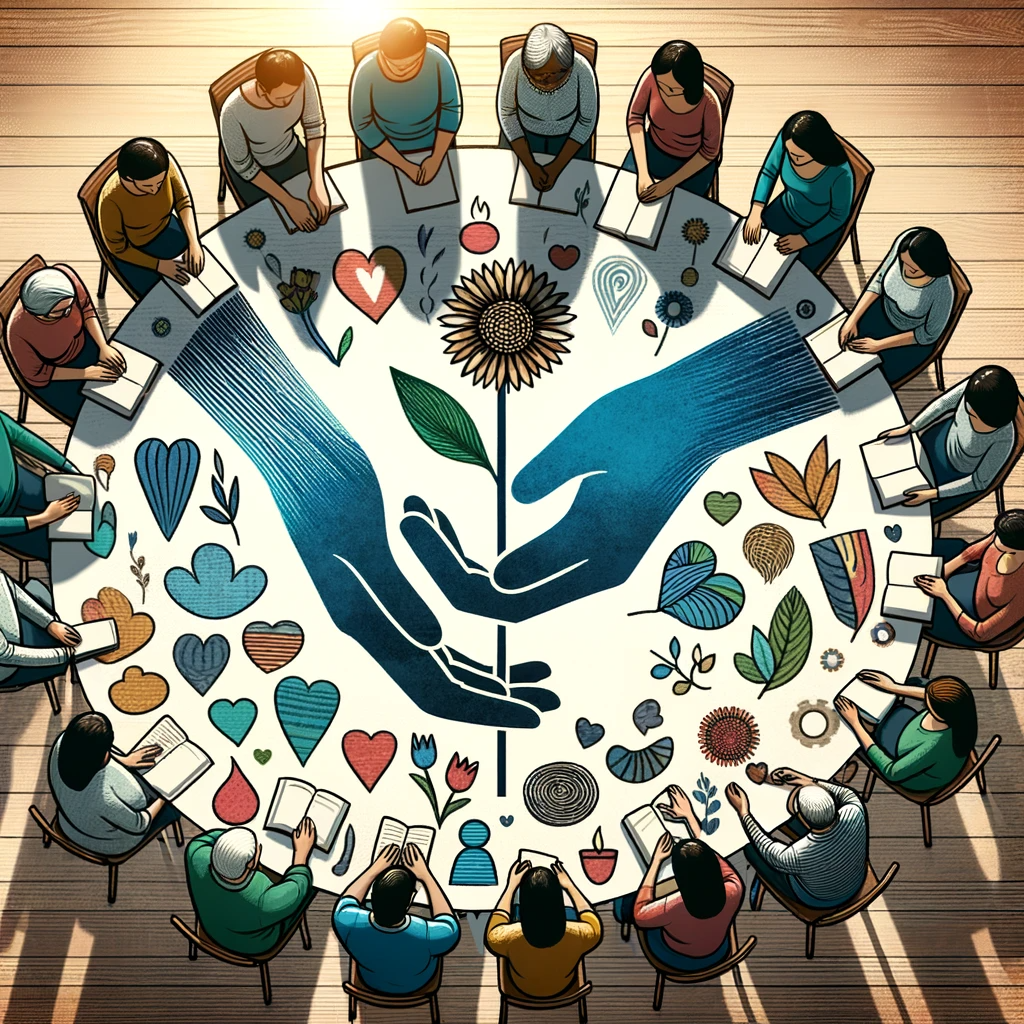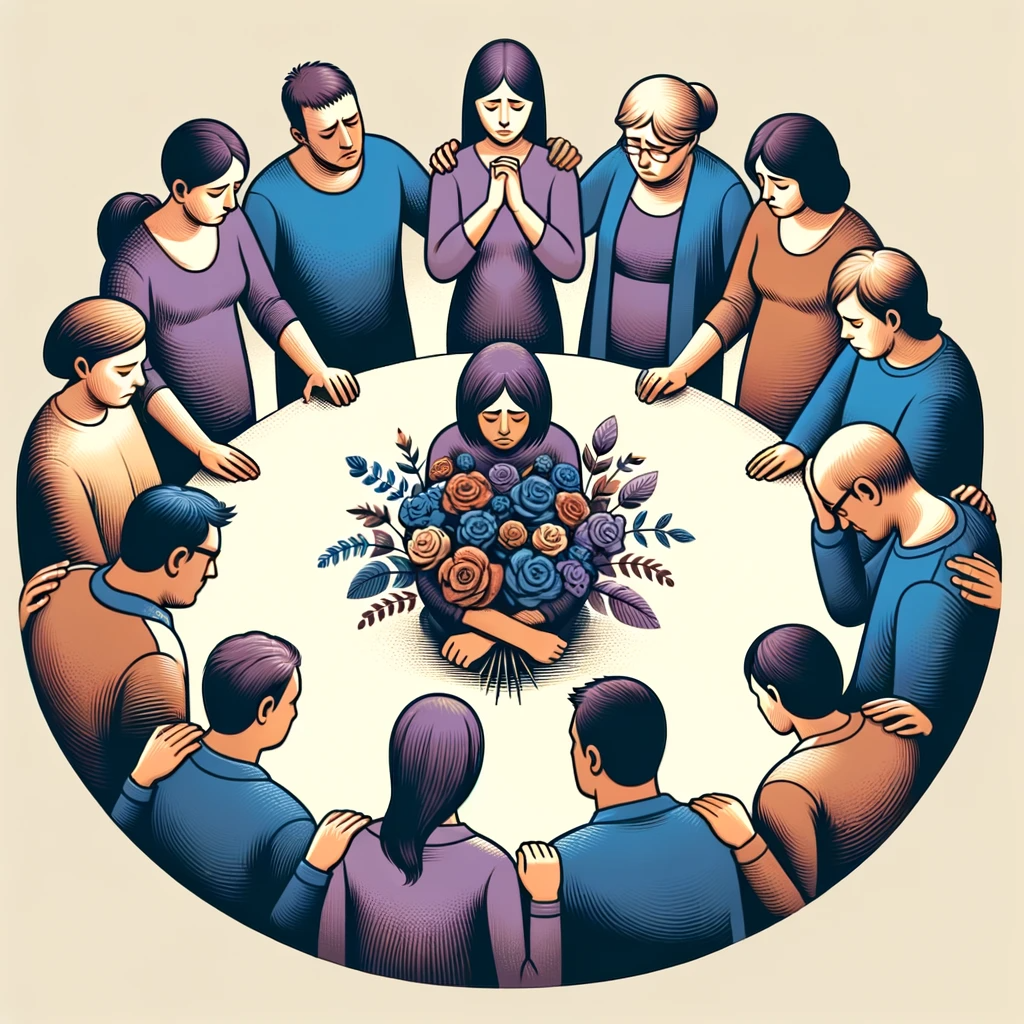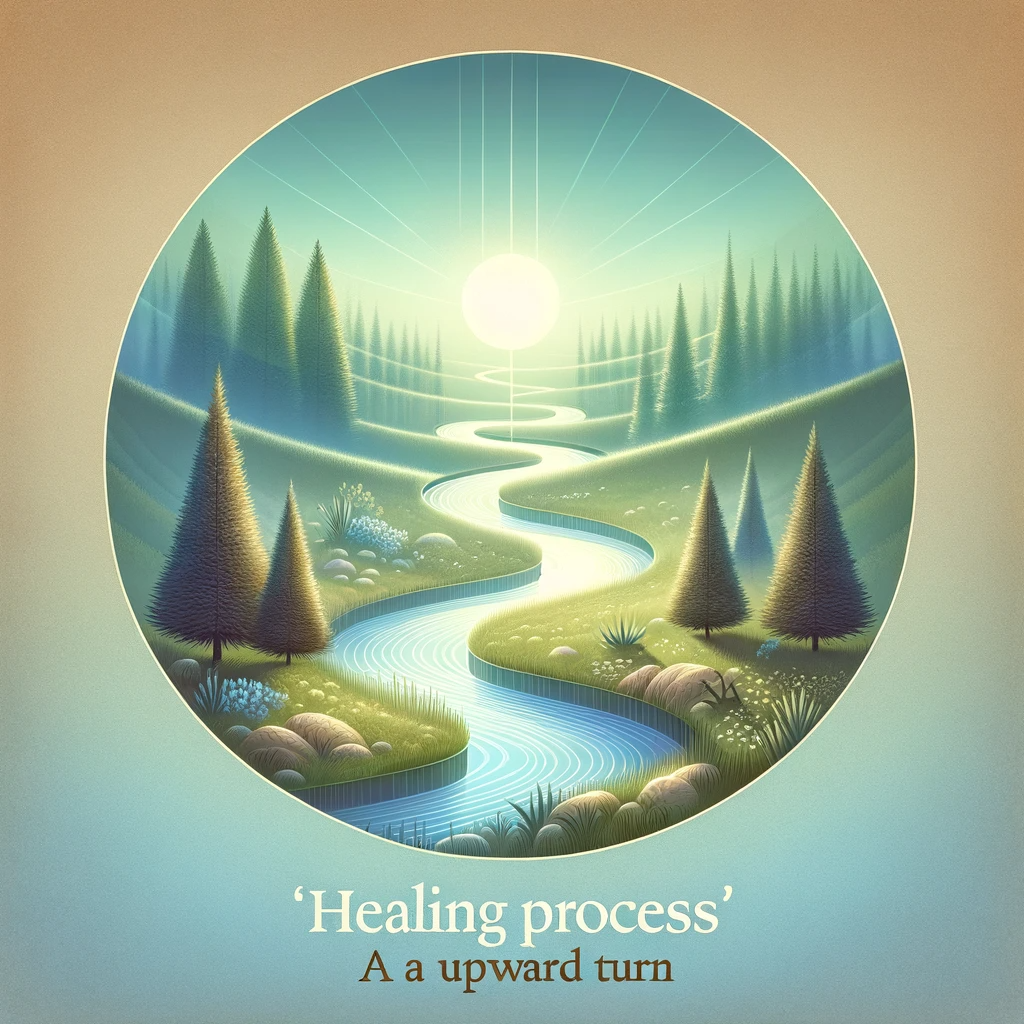Demystifying Grief: Debunking Common Myths in the Journey Through Loss
Demystifying Grief: Debunking Common Myths in the Journey Through Loss" offers insightful guidance on understanding grief. It challenges misconceptions, explores the grieving process's complexities, and provides compassionate strategies for healing and support.

Understanding the realities of grief
Grief, a universal human experience, is often shrouded in misconceptions and myths. Its complex and deeply personal nature makes it a subject that's not only hard to grasp but also frequently misunderstood. This article aims to shed light on some of the most common myths surrounding grief, providing clarity and support to those navigating their own grief or helping others through their journey.
Understanding Grief: Navigating Through the Complexities of Loss
Grief is a multifaceted emotional response to loss that transcends the mere notion of sadness following the death of a loved one. It encompasses a broad spectrum of experiences, including the loss of a job, the end of a relationship, the passing of a pet, financial struggles, or the upheaval caused by life-altering illnesses or injuries. This complex process affects individuals on multiple levels - emotionally, physically, mentally, and behaviorally.
The 5 Stages of Grief: A Framework by Elisabeth Kübler-Ross
Elisabeth Kübler-Ross, a Swiss-American psychiatrist, introduced the concept of the five stages of grief in her work with terminally ill patients.
These stages include:
Denial: A natural reaction to initial loss where individuals may refuse to accept the reality of the situation.
Anger: Feeling angry at the situation, oneself, others, or a higher power.
Bargaining: Attempting to negotiate or make deals (often with a higher power) to postpone or mitigate the loss.
Depression: Intense sadness and hopelessness that can lead to withdrawal from life.
Acceptance: Coming to terms with the loss and starting to adapt to the new reality.
It's important to note that not everyone experiences all five stages, nor do they necessarily occur in a linear order. Some people might revisit certain stages multiple times.
The Seven Stages of Grief: Expanding the Model
Some mental health professionals extend the Kübler-Ross model to include seven stages, adding:
Shock and Disbelief: An initial paralysis at hearing the bad news.
Testing: Seeking realistic solutions and ways to cope.
These additional stages provide a more comprehensive view of the grieving process, acknowledging the initial shock that often accompanies loss and the eventual journey towards finding a way to cope.

Why Grief is Often Misunderstood: Exploring the Complexity of Mourning
Grief is a deeply personal and intricate process that is often misunderstood due to its multifaceted nature. It's influenced by a myriad of factors such as cultural background, religious beliefs, family dynamics, individual personality, and gender, making it a unique experience for everyone. This variability contributes to the complexity and frequent misconceptions surrounding grief.
Beyond the 5 Stages of Grief : A More Inclusive Understanding
While the five stages provide a framework, they don't encompass the full spectrum of the grieving experience. Not everyone goes through all these stages, nor do they necessarily experience them in order. Some may revisit certain grief stages multiple times or skip others entirely.
Moreover, mental health professionals recognize that grief can sometimes expand into seven stages, adding phases like shock and disbelief at the beginning and testing as individuals seek realistic ways to cope.
The Overlap and Distinction Between Grief and Clinical Depression
Grief can sometimes be confused with clinical depression, especially since both share common elements like profound sadness and withdrawal from usual activities. However, they are distinct experiences. In grief, feelings of loss and emptiness are predominant, whereas in clinical depression, persistent feelings of worthlessness depression sadness and self-loathing are more common. Unresolved grief, however, can potentially lead to a state of prolonged depression, highlighting the importance of addressing and processing grief.
The Importance of Support Systems and Bereavement Groups
Support systems, including family, friends, and bereavement groups, provide an essential network for individuals experiencing grief. Sharing the journey with others who have similar experiences can be comforting and reassuring.

The Diverse Nature of Grief
Understanding the diverse nature of grief is key to providing empathy and support. Grief can be influenced by the relationship with the lost loved one's death itself, cultural practices surrounding death and mourning, personal coping mechanisms, and previous experiences with loss. Additionally, the type of loss – sudden vs. anticipated, violent vs. peaceful – can significantly impact the grieving process.
Recognizing the Uniqueness of Each Grieving Journey
In conclusion, grief is often misunderstood because of its complex, highly individualistic nature, and the societal misconceptions surrounding it. Recognizing that each person's grief is unique and that there is no standard way to experience or process loss is crucial in supporting grieving individuals. By acknowledging and respecting these differences, we can offer more empathetic and effective support to those navigating the challenging journey of grief.
Exploring the Complex Terrain of Grief: Myths Versus Realities
Grief, an inherently intricate and deeply personal process, is often shrouded in myths that can obscure our understanding of it. By dissecting these myths and contrasting them with realities, we can gain a clearer, more compassionate understanding of the grieving process.
Decoding Grief: Separating Myths from Realities
Grief is an inherently complex and deeply personal experience, often surrounded by myths and misconceptions. Understanding these can be crucial in providing appropriate support to those in grief and in managing one's own grieving process.
Myth: Grief Always Follows the Five Stages in Order
Reality: The five stages of grief – denial, anger, bargaining, depression, and acceptance, as outlined in the Kübler-Ross model, are not a rigid sequence that everyone follows. This model, initially developed from Elisabeth Kübler-Ross's work with terminally ill patients, serves as a framework rather than a strict progression. Grievers might experience these stages in different orders, or some may not go through all stages. Additionally, the grieving process can include other feelings not encapsulated by these five stages, such as guilt or relief, underscoring the unique nature of each person’s grief.
Myth: There is a Right and Wrong Way to Grieve
Reality: There is no correct, right or wrong way" to grieve. Each person's response to loss is influenced by individual factors such as cultural background, personal coping mechanisms, and the nature of the relationship with the deceased. Mental health professionals emphasize that what's most important is acknowledging and processing these feelings in a way that's authentic to the individual, whether that means seeking solitude, joining support groups, or engaging in bereavement counseling.
Myth: Grief Has a Set Time Limit
Reality: Grief doesn't adhere to a timetable. The intensity and duration of grief vary greatly among individuals. While some may find a sense of resolution within months, others may grapple with their loss for years. The notion of an “upward turn” or a final stage of grief can be misleading, as it suggests a linear progression towards resolution. In reality, grief can ebb and flow, with periods of intense sadness resurfacing even after long periods of seeming acceptance.

Myth: Grief and Clinical Depression are the Same
Reality: While grief can manifest in symptoms similar to clinical depression, such as intense sadness, insomnia, and a loss of interest in activities, they are distinct experiences. Grief is typically tied to thoughts and memories of the deceased, whereas clinical depression often involves a pervasive sense of worthlessness and a lack of pleasure in all aspects of life. Unresolved grief, however, can evolve into a more chronic, depressive-like condition, making the role of mental health professionals crucial in providing support and intervention when needed.
Myth: Grief Diminishes as Time Passes
Reality: The intensity of grief can change over time, but it doesn't necessarily diminish in a linear or predictable way. Anniversaries, holidays, and other triggers can rekindle feelings of loss. It's not about the pain lessening over time; rather, it's about the griever learning to live with the loss and integrating it into their new reality.
Myth: Expressing Grief Weakens You
Reality: Expressing grief is a natural, healthy part of the healing process. Suppressing or denying these feelings can hinder emotional recovery. Encouraging the expression of grief – whether through talking, crying, art, or other forms – is important. Mental health professionals often help grievers find constructive ways to express and work through their grief.
Myth: Moving On Means Forgetting About the Loss
Reality: Moving on after a loss doesn't mean forgetting the person or the feelings associated with them. It's about finding ways to remember and honor the deceased while continuing to live a meaningful life. Acceptance is more about acknowledging the reality of the loss and learning to live with it as part of one's life story.
Myth: Expressing Grief Only Through Tears
Reality: Grief manifests in many ways, and crying is just one of them. Some people might find themselves unable to cry, while others might express their grief through anger, withdrawal, or even physical symptoms. The absence of tears does not diminish the validity or intensity of one's grief.
Myth: Ignoring Grief Will Make It Go Away
Reality: Avoiding or suppressing grief can lead to unresolved issues and potentially worsen mental health over time. It’s important to confront and process grief, often with the support of mental health professionals, support groups, or bereavement counseling.
Myth: The First Year of Grieving is the Hardest
Reality: While the first year can be particularly challenging due to the 'firsts' without the loved one, grief has no set timeline. Some may find subsequent years harder as the permanence of the loss settles in. Each person's experience with time and grief is unique.
Myth: The End Goal of Grief is Closure
Reality: The concept of closure in grief is subjective and varies from person to person. For some, it may mean accepting the reality of the loss, while for others, it might involve finding a way to maintain a connection with the memory of the loved one. Closure is not about forgetting or ‘moving on’ but about finding a way to live with the loss.
Myth: You Should ‘Get Over’ Grief
Reality: Grief is not an obstacle to be overcome but a journey to be navigated. It's an ongoing process that might require professional help, such as grief counseling or therapy, especially when it interferes with daily functioning or leads to prolonged depression.
Myth: Grief and Mourning Are the Same
Fact: Grief and mourning, while related, are not identical. Grief is the internal, emotional response to loss. It encompasses a range of feelings from deep sadness to anger, and can be experienced in the wake of any significant loss. Mourning, on the other hand, is the external expression of grief. It involves the rituals and behaviors that society associates with loss, such as funerals, wearing black, or other cultural practices. Mourning is how grief is publicly acknowledged and expressed.

Myth: Men and Women Grieve Differently
Fact: While cultural stereotypes may suggest that men and women grieve differently, the truth is more nuanced. The grieving process is influenced more by individual personality, cultural background, and the nature of the relationship with the deceased than by gender alone. Both men and women can experience a wide range of emotions during the grief process, and there's no uniform way in which either gender experiences or expresses these feelings.
Embracing the Individuality of Grief
In summary, understanding grief involves acknowledging its complexity and the fact that it manifests differently for everyone. Dispelling common myths about grief helps in developing a more compassionate approach, both for those who are grieving and for those supporting them. It's about respecting each person's unique journey through grief and recognizing that the process is not a linear path to be hurried, but a personal journey of integration and adaptation.
Truths About Grief: Understanding the Complex Emotional Landscape
Grief is an intensely personal and multifaceted experience, often misconstrued and oversimplified. Understanding the truths about grief can help in providing appropriate support to those who are grieving and can also aid individuals in navigating their own grief more effectively.
Grief is Non-Linear and Highly Personal
Grief doesn't follow a set pattern or timeline. The widely recognized five stages of grief – denial, anger, bargaining, depression, and acceptance, as conceptualized in the Kübler-Ross model, offer a framework but not a definitive path that everyone follows. Individuals may experience these stages in any order and might revisit some stages multiple times. Additionally, the grieving process can extend to seven stages, adding layers like shock and denial stage disbelief, and testing or seeking realistic solutions.
Grief Arises from Various Types of Losses
While the death of a loved one is a common cause of grief, it's not the only one. People can grieve over a wide range of losses, including the end of a relationship, loss of a job, or a significant change in health or lifestyle. The nature of the loss heavily influences the grieving process, making it a unique experience for each individual.

Suppressing Grief is Harmful; Expressing It Is Necessary
Suppressing or ignoring grief can lead to prolonged suffering and potential mental health issues, such as clinical depression. It's important for grieving individuals to express their emotions, whether it’s through crying, talking, or other forms of expression. This process is crucial for healing and adapting to the new reality after a loss.
Support and Professional Help are Valuable and Often Necessary
Support from family, friends, and bereavement groups can be immensely helpful. However, professional help from mental health professionals specializing in grief counseling is often crucial, especially when dealing with unresolved grief or when the grieving process interferes with daily life. Mental health professionals can provide guidance and strategies to help individuals process their grief in a healthy way.
Grief Involves a Range of Emotions
Grief can manifest in various emotions beyond just sadness or depression. Feelings of anger, guilt, relief, or even numbness are common. Understanding that these emotions are natural reactions to loss can help individuals feel validated in their grieving process.
Grief Affects Everyone Differently
Not everyone will experience grief in the same way. Factors such as cultural background, personal resilience, the nature of the relationship with the lost entity, and previous experiences with loss all play a role in how a person grieves. Recognizing this diversity is essential in providing appropriate support.
Embracing the Complexity of Grief
In conclusion, grief is a complex, non-linear process that varies greatly from person to person and loss to loss. Understanding these truths about grief can lead to more effective self-care and support for others. Recognizing the need for expressing emotions, seeking support, and possibly obtaining professional help are key steps in the healthy processing of grief. By acknowledging and respecting the unique nature of each person’s grief, we can better support ourselves and others through this profound and universal human experience.
Healing Process: An Upward Turn
The healing process in grief is not linear but often described as an upward turn, where the intense emotions start to subside, and one begins to see a path forward. Accepting and working through grief allows individuals to start re-engaging with life and finding a new sense of normalcy.

Finding Hope and Building a New Reality
Ultimately, grief is about transformation. It's about learning to live with the loss and integrating it into one's life. In the process, many find a renewed sense of hope and purpose. While the pain of loss might never fully disappear, learning to live with it can lead to personal growth and a deeper appreciation for life.
In summary, grief is a deeply personal and multifaceted response to loss, encompassing a range of emotions and stages. Recognizing its complexities, seeking support, and allowing oneself the space to grieve in one's own way are vital steps in the journey towards healing.
Frequently Asked Questions (FAQs) about Grief
What is the first stage of grief and how is it typically experienced?
The first stage of grief, according to the Kübler-Ross model, is denial. In this stage, individuals often have difficulty accepting the reality of their loss. This denial is a natural defense mechanism that helps to numb the initial shock. It's common for people to feel overwhelmed, disoriented, or to cling to a false, preferable reality.
How do family members typically react during the grieving process?
Family members may experience and express grief differently based on their relationship with the deceased, their coping styles, and cultural background. It's common for some to express overt emotions like crying, while others might withdraw or appear stoic. Understanding and respecting these different grieving styles is important for family dynamics during this time.
Is feeling anger a normal part of the grieving process?
Yes, feeling anger is a normal and natural reaction during grief. It often emerges as the second stage in the Kübler-Ross model, where individuals might direct anger towards others, themselves, the deceased, or even inanimate objects. It's important not to suppress this anger, as acknowledging and expressing it is a crucial step towards healing.
What factors influence the way a person grieves?
Many factors can influence grief, including the individual's personality, the nature of their relationship with the deceased, their cultural and religious beliefs, past experiences with loss, and their current support systems. These factors can determine the intensity and duration of grief, as well as how it is expressed.
What is the last stage of grief, and does reaching it mean the grief is over?
The last stage of grief, as per the Kübler-Ross model, is acceptance. This stage is characterized by an upward turn in the grieving person's emotions, where they start to accept and adapt to life without their loved one. However, reaching this stage doesn't mean grief is completely over; it's an ongoing process, and feelings of loss might resurface from time to time.
How can a mental health professional help with the grieving process?
A mental health professional can provide valuable support and guidance during grief. They can help individuals process their emotions, develop coping strategies, and work through complicated feelings. Therapy can offer a safe and understanding environment to explore and understand grief, helping individuals to adjust to their new reality.
Is it common to feel deserted or alone during grief?
Yes, feeling deserted or experiencing a sense of loneliness is common during grief. As people grieve, they might feel isolated in their pain or believe that others cannot truly understand their loss. It's important to seek support from friends, family, or support groups to alleviate these feelings.
What is meant by 'suppressed anger' in the context of grief, and why is it significant?
Suppressed anger in grief refers to the internalization or hiding of anger that a grieving person may feel. This suppression can be due to societal expectations, personal beliefs, or an attempt to protect others. However, failing to acknowledge and express this anger can hinder the healing process and potentially lead to unresolved grief.
“They say time heals all wounds, but that presumes the source of the grief is finite” ― Cassandra Clare, Clockwork Prince
Join our Grief Recovery Room Support Group
Signs and Symptoms of Grief and When to Seek Help
Share Your Sorrow: Writing To Heal
Create a Memorial Page for Your Family Member
Grieving the Loss of a Spouse or Life Partner
Grieving the Loss of a Grandparent
Grieving the Loss of an Infant or Child
Grieving the Loss of a Sibling ( brother or sister)
Grieving the Loss of an Adult Child
You might also like this article:





